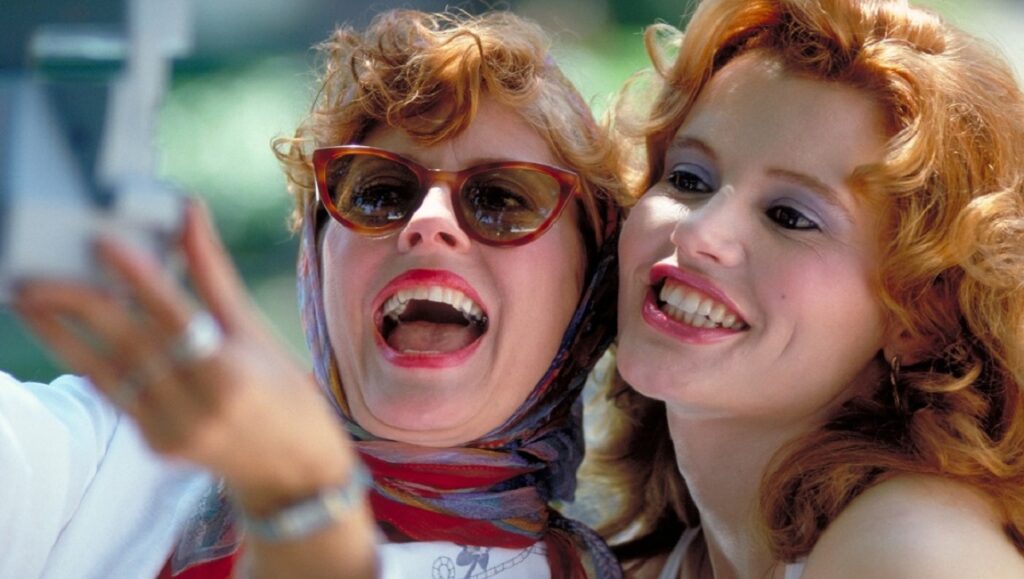At the crossroads of about a half-dozen genres and borrowing the best that each has to offer, there’s no other movie quite like Ridley Scott’s Thelma & Louise. It’s remarkable that a Brit previously known for atmospheric slow-burns like Alien and Blade Runner helmed what is now considered a quintessentially American and groundbreakingly feminist action-comedy. At its core are two women, beautiful, freewheeling Thelma (Geena Davis) and sensible, no-nonsense Louise (Susan Sarandon), whose abiding, unshakeable friendship guides them through attempted rape, murder, and an exhilerating interstate manhunt.What started as a clandestine vacation morphs into an escape. Not only do they flee a crime scene, they’re also escaping the doldrums of conventional, small-town Arkansas – and, by extension, conventional, small-town womanhood. Thelma is married to a controlling and insecure carpet salesman (played with beady-eyed self-righteousness by Christopher McDonald), the only man she’s ever been with. Louise, a career waitress, dates a well-meaning but flailing musician who’s often on the road (a sad sack Michael Madsen). A running theme is the idea of getting what you settle for: Thelma settled for Darryl’s snide condescension, while Louise, who seems to genuinely care for Jimmy, nonetheless brushes off his proposal with a platitude about “bad timing.” Neither women lack the courage or resolve to find, much less fight for, something better. They just have never had an opportunity until now.
Callie Khouri, who won the 1992 Academy Award for Best Screenplay for what was her first-ever film, astutely captures the nuanced warmth and exasperation of female friendship. We’re initially led to believe that of the two, Louise is the responsible one, occasionally bordering on uptight. Yet in a moment of rage and trauma, she’s the one who pulls the trigger and sets the film into motion. Her own backstory, involving an incident in Texas she refuses to acknowledge, binds her even closer to Thelma. Later, when she has a breakdown after being robbed, Thelma is the one who immediately springs into action. The women take turns mothering each other; when one is in need, the other taps into a reservoir of ingenuity and resilience to create a plan, no matter how dire the situation. Neither woman is “the pretty one” or “the strong one” – they are both of these things and so much more. A huge part of the movie’s appeal is seeing these women transcend the cliches that have been forced upon them. When Detective Slocum (an improbably avuncular Harvey Keitel) explains to Darryl that Thelma is linked to the murder, his incredulous, spluttering response reveals not only his inanity, but the depth of his ignorance and the limits of his imagination. Later, after she calmly forces a state trooper into the trunk of his own car, she says with more than a little pride, “I know it’s crazy, but I just feel like I got a knack for this shit.” She’s absolutely right, and her evolution is a joy to behold.
The women take turns mothering each other; when one is in need, the other taps into a reservoir of ingenuity and resilience to create a plan, no matter how dire the situation. Neither woman is “the pretty one” or “the strong one” – they are both of these things and so much more.
Khouri has stated that she didn’t set out to write a feminist manifesto, and there’s a key scene that perfectly illustrates the perniciousness of even attempting such a thing. After Thelma’s encounter with Harlan, her would-be rapist, she and Louise have a tense exchange in which Louise essentially victim-blames her for the murder: “If you weren’t concerned with having so much fun, we wouldn’t be here right now!” Despite their friendship, their closeness, and everything these women know about the world they live in, this conversation still has to happen before they can address the situation. Harlan was a known creep, but it’s understood that men like him get away with violence all the time, just as, on a smaller scale, Darryl gets away with being a selfish, insensitive oaf. Even J.D., the charming grifter played so memorably by a young Brad Pitt, is another vehicle for harm. His violation is financial rather than physical, but equally damning. Jimmy and Slocum seem to exist outside this paradigm, but it doesn’t matter. Their efforts to reach Thelma and Louise are too little and far too late.
In a world where men are constantly committing large and small acts of cruelty against the women in their lives (and, just as often, women they don’t know – like the crude truck driver who so satisfyingly gets his comeuppance) it’s no wonder these women aren’t convinced by Slocum’s entreaties. Scott and Khouri squeeze into two hours a vast spectrum of female experience, from sexual violence to sexual pleasure, cagey domestication to outlaw freedom. Even as the FBI closes in, we see them driving down endless empty roads in Louise’s bright green Thunderbird, singing along to the radio and simply enjoying each other’s company. When backed into a corner (or in their case, a canyon), why wouldn’t they, once again, choose each other? In this case, they’ll settle for nothing less.
Part of Kicking the Canon – The Film Canon.


Comments are closed.